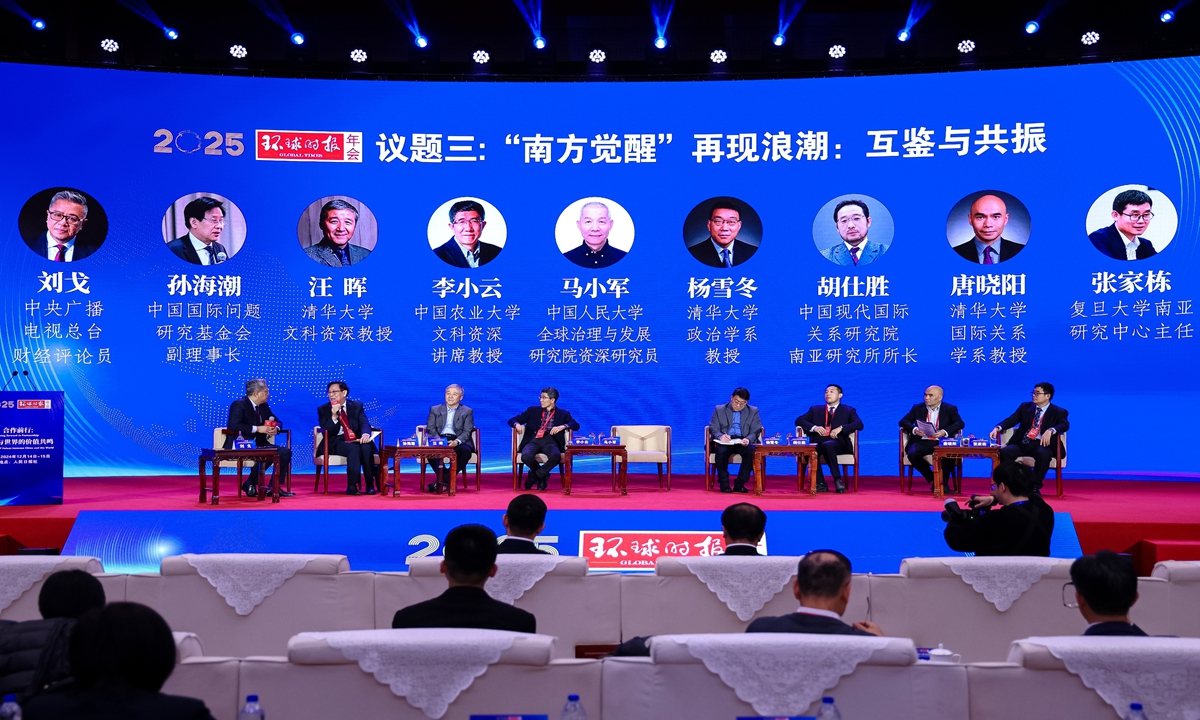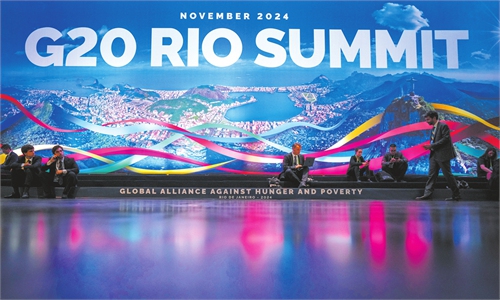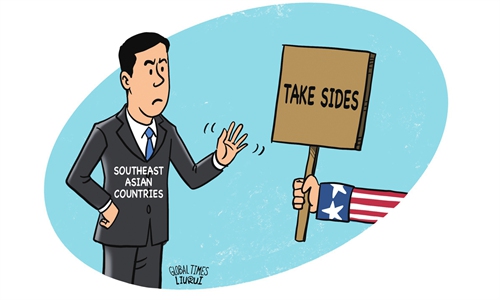The resurgence of the awakening of the Global South: mutual learning and resonance

Participants speak at the third session "The resurgence of the awakening of the Global South: mutual learning and resonance" of the Global Times Annual Conference 2025.
Editor's Note:
The Global Times Annual Conference 2025, themed, "Moving forward in Partnership: Resonance of Values between China and the World," was held in Beijing on Saturday. The Global Times invited over 100 prominent figures and experts from politics, academia, and business, both domestically and internationally, to discuss four major topics. They explored, from different perspectives, the practical paths and efforts for China and the world to move forward together and build a community with a shared future for mankind. The op-ed desk will publish relevant content for four consecutive days. Today's publication features the third session of the conference, "The resurgence of the awakening of the Global South: mutual learning and resonance."
In 2024, the global landscape has undergone profound changes, with the "Global South" gaining significant momentum and its influence continuously rising, playing an increasingly important role in the advancement of humanity. As a distinct symbol of the major changes in the world, the collective awakening of the "Global South" is primarily an economic awakening. As the economies of the Global South continue to grow, their collective call for peace and development on multilateral platforms such as BRICS plus and the G20 has become unstoppable.
The awakening process is still ongoing
Sun Haichao, vice chairman of China Foundation for International Studies
The awakening, rise and development of Global South countries, collectively advancing toward modernization and altering the balance of power in international relations, represent a significant event in world history. This is first reflected in the growing role of Global South countries in international affairs and their increasing influence on world peace, stability and economic development. For example, since the onset of the Russia-Ukraine conflict, Global South countries have refused to take sides. Following the outbreak of a new round of the Palestine-Israel conflict, during which Gaza and southern Lebanon have been turned into a "hell on earth," the Global South has voiced condemnation and adopted a unified stance. Several countries have even announced the severing of diplomatic ties with Israel - an unprecedented phenomenon.
The "Greater BRICS" demonstrates the power of unity and represents the leading group of the Global South. At this year's G20 Leaders' Summit, the primary focus on the concept of "global governance" highlighted an important international platform for the participation of Global South countries. Amid prolonged Russia-Ukraine hostilities and escalating conflict in the Middle East, along with severe geopolitical and geo-economic turbulence worldwide, the role that the Global South plays in the global economy has become increasingly prominent. BRICS countries now contribute over 50 percent to global economic growth, with China alone being the source of more than 30 percent. Additionally, the China-Africa cooperation mechanism has had a significant impact on advancing global modernization.
Therefore, the rise of the Global South is an essential aspect of changes unseen in a century. The demand for a fairer and more equitable international order has become stronger and more direct, and this awakening process continues to unfold.
Li Xiaoyun, a professor at China Agricultural University
We need to recognize the complexity of national conditions of Global South countries. Their development must take into account geopolitical changes and various other factors, rather than relying on our original assumptions. China is a member of the Global South while also having some differences from other countries in this group.
Without a core driving force, the Global South would be fragmented. This core driving force should have the capacity to provide economic support, share development experience, and establish organizations that serve the interests of Global South countries. From this perspective, China currently meets these requirements.
First, China is the only country within the Global South that has the capacity to engage in substantial South-South cooperation; second, China possesses unique development experiences; and third, China actively promotes organizations focused on the development of Global South countries, such as the BRICS New Development Bank and the Asian Infrastructure Investment Bank.
China's role among Global South countries should be that of an important resource supporter, experience provider, coordinator, and a true force for unity.
China serves as a model for the Global South
Wang Hui, a senior professor of humanities at Tsinghua University
Beyond its geopolitical significance, the Global South represents a force that is changing the fundamental state of the world, including the state of rules. The ultimate goal of the Global South is not merely to address its own issues, but to confront global challenges. When discussing the issues facing the Global South, we must not separate our thinking from the basic challenges that the contemporary world encounters, while also reexamining China's role in this process.
China's actions serve as a model. For example, in advancing the Belt and Road Initiative, China's approach differs from that of developed countries in these regions. This mode of behavior helps to craft a narrative about China's actions, which is welcomed by Global South countries that have long been affected by colonial and post-colonial dilemmas. China's exploration of an independent path to modernization, along with its advocacy for countries and regions to find their own paths to modernization, can exert influence and provide leadership. Together with the Global South, China can drive improvements in the existing order and contribute to the formation of a new order.
Tang Xiaoyang, a professor in the Department of International Relations at Tsinghua University
In the past two years, the rise of Global South countries marks a turning point in world history. The combined GDP of the original five BRICS nations, when calculated based on purchasing power parity, has exceeded that of the Group of Seven (G7). In 2023, China's total exports to ASEAN, Africa, other BRICS nations, and Central Asian countries surpassed its exports to traditional developed nations such as the US, Japan and those in Europe. This indicates that Global South countries have transitioned from being marginalized "poor partners" to becoming major players in global development and reliable partners for China.
Looking ahead to 2025, the development trajectory of Global South countries will primarily focus on economic growth while also emphasizing political and cultural advancement. The "Global South" highlights the importance of maintaining an autonomous political identity while promoting globalization. This autonomy underscores the importance of preserving independence and self-determination within global connections, thereby achieving genuine self-development against the backdrop of globalization.
As the leader among the Global South countries, China's economy not only serves as a model for development experiences worldwide, but also acts as a stabilizer and engine for the global economy. The new challenge lies in how China can drive the development of Global South countries and foster shared ideas amid the political diversification within the Global South.
China can take on the role of a bridge between Global South and Global North
Yang Xuedong, director of the Department of Political Sciences at Tsinghua University
The concept of the Global South has evolved from an intellectual and political imagination into a social cognition. A defining characteristic of the Global South is its high degree of diversity in political, economic, and cultural aspects, but this diversity creates vulnerabilities that pose challenges to collective action.
Furthermore, the modernization of the Global South is globally interconnected. This interdependence, when weaponized, risks mutual harm and challenges the future development of Global South countries.
China should leverage the development achievements and experiences accumulated over the past four decades to find its own suitable role. China can advocate for a new agenda within the global system, highlighting which aspects of development in Global South countries require greater attention from the international community. China's integration into the global system fosters strong connections, enabling it to bridge the Global South and the Global North. This role is precisely determined by China's position in the global landscape.
Hu Shisheng, director of the Institute of South Asian Studies at the China Institutes of Contemporary International Relations
The 16th BRICS Summit, held from October 22 to 24 in the Russian city of Kazan, was the first after the historic expansion of BRICS. It also marked a significant moment in the Global South awakening. The "BRICS Plus" model has become a paradigm for South-South cooperation among emerging market economies and developing countries, driving the Global South to build a non-Western system, particularly in the financial sector.
The rise of the Global South must overcome three challenges. First, it should enhance cohesion and integration to ensure aligned actions and consistent progress. Second, it must address internal tensions, resolve structural contradictions, and explore ways for medium-sized powers and major countries to coexist. Third, it must break through the Western-dominated world order.
Since the Global South has already risen and taken action, its future development prospects are quite promising. The expanded "Greater BRICS" serves as the leading force of the Global South. We can refer to the Global South as the "BRICS South" (BRICS+ South), emphasizing collective leadership to effectively address these three major challenges.
Zhang Jiadong, director of the Center for South Asian Studies at Fudan University
The characteristics of the Global South include openness, equality and inclusiveness. The emergence of the concept of the Global South signifies a significant shift in the discourse of international relations - from a hierarchical system of "colonizer and colonized" to a seemingly equal but differentiation-emphasizing "core and periphery" system, and now toward an egalitarian system. This marks a profound change.
The most important issues in today's world are the economic development model and the global governance deficit. The Global South focuses on these issues as part of its commitments to a shared future for mankind.
China is highly regarded among the countries of the Global South because these nations generally seek a strong alternative to the US to take the lead. However, the term "lead" here refers to a role of guidance, not that of a dominant power. Therefore, when studying the Global South, the concept should be considered within the framework of global governance, rather than within the realms of international politics or geopolitics.
Ma Xiaojun, a research fellow at the Institute of Global Governance and Development at Renmin University of China
2024 is a significant year for Global South cooperation. China's "Global South diplomacy" is taking shape in several key ways: First, China increasingly identifies as part of the Global South, with the term gaining prominence in its diplomatic discourse. Second, China's head-of-state diplomacy is steering and guiding the Global South diplomatic framework, promoting unity among Global South countries. Third, over the past year, China has become an active supporter and practitioner of development for the Global South, implementing a large number of high-quality projects globally, which brings confidence and hope to Global South countries.
As for the direction of China's Global South diplomacy in the new year, the Global South encompasses a large number of regional and medium-sized powers, which should be the focus of China's diplomatic efforts in a world undergoing changes unseen in a century. Furthermore, within the framework of the Belt and Road Initiative or in a broader context, it is essential to strengthen the implementation of China's major policies aimed at the people and development of the Global South in order to achieve tangible results.



